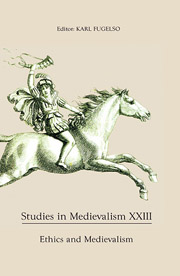Book contents
- Frontmatter
- Acknowledgments
- Contents
- List of Illustrations
- Epigraph
- Editorial Note
- I Ethics and Medievalism: Some Perspective(s)
- II Interpretations
- What if the Giants Returned to Albion for Vengeance? Crusade and the Mythic Other in the Knights of the Nine Expansion to The Elder Scrolls IV: Oblivion
- The Dark Ages of the Mind: Eugenics, Amnesia, and Historiography in Dan Brown's Inferno
- Plastic Pagans: Viking Human Sacrifice in Film and Television
- Meat Puzzles: Beowulf and Horror Film
- Words, Swords, and Truth: Competing Visions of Heroism in Beowulf on Screen
- Socialism and Translation: The Folks of William Morris's Beowulf
- “We Wol Sleen this False Traytor Deeth”: The Search for Immortality in Chaucer's Pardoner's Tale and J. K. Rowling's The Deathly Hallows
- Intention or Accident? Charles Alfred Stothard's Monumental Effigies of Great Britain
- Contributors
- Previously published volumes
Words, Swords, and Truth: Competing Visions of Heroism in Beowulf on Screen
from II - Interpretations
Published online by Cambridge University Press: 05 May 2014
- Frontmatter
- Acknowledgments
- Contents
- List of Illustrations
- Epigraph
- Editorial Note
- I Ethics and Medievalism: Some Perspective(s)
- II Interpretations
- What if the Giants Returned to Albion for Vengeance? Crusade and the Mythic Other in the Knights of the Nine Expansion to The Elder Scrolls IV: Oblivion
- The Dark Ages of the Mind: Eugenics, Amnesia, and Historiography in Dan Brown's Inferno
- Plastic Pagans: Viking Human Sacrifice in Film and Television
- Meat Puzzles: Beowulf and Horror Film
- Words, Swords, and Truth: Competing Visions of Heroism in Beowulf on Screen
- Socialism and Translation: The Folks of William Morris's Beowulf
- “We Wol Sleen this False Traytor Deeth”: The Search for Immortality in Chaucer's Pardoner's Tale and J. K. Rowling's The Deathly Hallows
- Intention or Accident? Charles Alfred Stothard's Monumental Effigies of Great Britain
- Contributors
- Previously published volumes
Summary
The calendar of American colleges and universities is such that many classes in early British literature were reading Beowulf shortly before or after 11 September 2001. To some of these instructors and students, Beowulf's advice to Hrothgar that “it is better for everyone to avenge his friend than to mourn much” (Sēlre bið ǣġhwǣm / þæt hē his frēond wrece bonne hē fela murne) had a peculiar resonance as this nation both mourned and contemplated a military response. The following years have seen a remarkable outpouring of new Beowulfs, in print, performance, and newer media. While the reasons for this phenomenon are doubtless manifold and complex, the products of this curious renaissance can offer insight into current values and anxieties in our culture. These are large and complex issues, and though they cannot be explored fully in the space of one essay, I hope to contribute to that project by focusing on the treatments of the hero in a few of these productions.
As scholars of medievalism are well aware, the way heroes of ancient and medieval tales are re-imagined for contemporary audiences says a great deal about our own conceptions of the heroic: what is desirable and what is possible in a hero for our time. This is true for a wide range of subjects and throughout the long history of medievalisms, Robin Hood and various characters from the Arthurian legend being perhaps the most endlessly malleable.
- Type
- Chapter
- Information
- Studies in Medievalism XXIIIEthics and Medievalism, pp. 147 - 166Publisher: Boydell & BrewerPrint publication year: 2014



